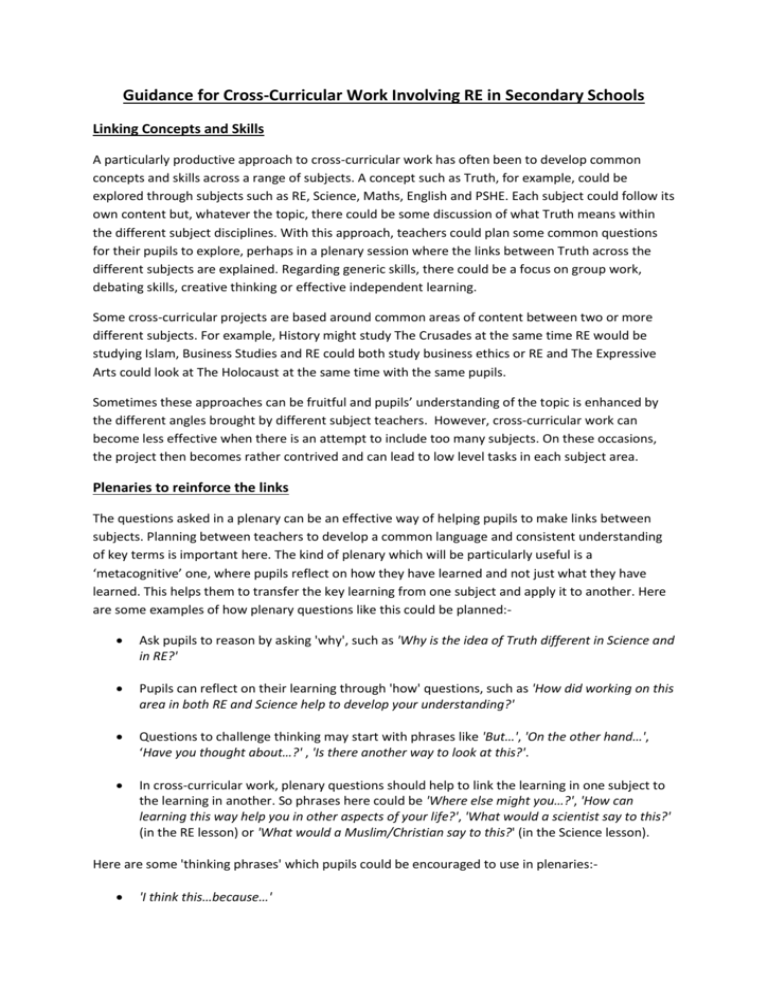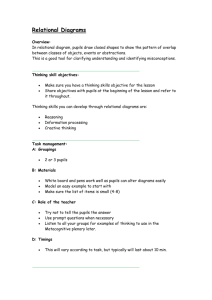Guidance for Cross-Curricular Work Involving RE in Secondary
advertisement

Guidance for Cross-Curricular Work Involving RE in Secondary Schools Linking Concepts and Skills A particularly productive approach to cross-curricular work has often been to develop common concepts and skills across a range of subjects. A concept such as Truth, for example, could be explored through subjects such as RE, Science, Maths, English and PSHE. Each subject could follow its own content but, whatever the topic, there could be some discussion of what Truth means within the different subject disciplines. With this approach, teachers could plan some common questions for their pupils to explore, perhaps in a plenary session where the links between Truth across the different subjects are explained. Regarding generic skills, there could be a focus on group work, debating skills, creative thinking or effective independent learning. Some cross-curricular projects are based around common areas of content between two or more different subjects. For example, History might study The Crusades at the same time RE would be studying Islam, Business Studies and RE could both study business ethics or RE and The Expressive Arts could look at The Holocaust at the same time with the same pupils. Sometimes these approaches can be fruitful and pupils’ understanding of the topic is enhanced by the different angles brought by different subject teachers. However, cross-curricular work can become less effective when there is an attempt to include too many subjects. On these occasions, the project then becomes rather contrived and can lead to low level tasks in each subject area. Plenaries to reinforce the links The questions asked in a plenary can be an effective way of helping pupils to make links between subjects. Planning between teachers to develop a common language and consistent understanding of key terms is important here. The kind of plenary which will be particularly useful is a ‘metacognitive’ one, where pupils reflect on how they have learned and not just what they have learned. This helps them to transfer the key learning from one subject and apply it to another. Here are some examples of how plenary questions like this could be planned: Ask pupils to reason by asking 'why', such as 'Why is the idea of Truth different in Science and in RE?' Pupils can reflect on their learning through 'how' questions, such as 'How did working on this area in both RE and Science help to develop your understanding?' Questions to challenge thinking may start with phrases like 'But…', 'On the other hand…', ‘Have you thought about…?' , 'Is there another way to look at this?'. In cross-curricular work, plenary questions should help to link the learning in one subject to the learning in another. So phrases here could be 'Where else might you…?', 'How can learning this way help you in other aspects of your life?', 'What would a scientist say to this?' (in the RE lesson) or 'What would a Muslim/Christian say to this?' (in the Science lesson). Here are some 'thinking phrases' which pupils could be encouraged to use in plenaries: 'I think this…because…' 'As I did this, I was thinking about…' 'The most difficult part was…because...' 'At first we thought…but later decided…' 'We had to change our ideas because…' 'I found this way of learning helpful because..' Drop-down days or curriculum integration? Many schools have used ‘drop down days’ as a means of planning cross-curricular work, where the normal timetable is suspended from time to time for a day, or maybe a week, so that pupils can have a new experience and work with different approaches. Often the day will revolve around a theme, such as relationships, through which a significant amount of RE could be taught. The advantage of this approach is that it frees up teachers to be more creative, without the constraints of their syllabus or programmes of study. However, the ‘drop down day’ approach (sometimes called Super Learning Days or Flexible Fridays) can have disadvantages. The organisation needed for different approaches to learning and new groupings can be time-consuming and cumbersome. There is a tendency too to include several low challenge activities, chosen more for their potential for enjoyment and time-filling rather than for the provision of a meaningful learning experience. Above all, even a successful ‘drop down day’ can have limited impact on the long-tem learning of pupils if it is a one-off experience. If a school chooses to use ‘drop down days’ to approach key RE concepts (or general concepts which would apply to RE), then this approach needs to be reinforced through the regular curriculum as well, so that pupils can see better how the drop down experience fits into the bigger picture of their learning and so that their actual RE learning is clear and identifiable. In this respect, rigorous cross-curricular work through the regular curriculum is arguably the best way forward, so that pupils can see constantly the conceptual links between the different subjects. Joint Planning – the Logistics There are different degrees to which teachers can engage in cross-curricular planning. The degree of engagement is not important – the crucial point is to ensure that pupils gain a quality learning experience, whether the cross-curricular link is on a small-scale or sustained over a longer period. Small-scale link - Planning jointly for plenaries Providing time for teachers to plan cross-curricular work is vital. In reality, the time for such planning can be limited. So it is probably better to focus the joint planning on a specific area of the lesson which will explore similar ideas in both (or all) subjects. For example, the RE teacher and Science teacher may each plan their own lessons separately, but agree that both will include a plenary which explores the notion of ‘Truth’, by the joint planning of a series of questions which will be similar in both subjects (see ‘Plenaries’ section). Larger-scale link – Team Teaching and Coaching Where time and school systems allow, the most effective cross-curricular work can come through coaching pairs or trios. Here the RE and Science teacher would team teach an occasional lesson, ideally with a class they teach in common, with the non-specialist concentrating on developing the pupils’ generic skills and understanding of key general concepts. Before and after the lesson, the teachers would develop each other’s thinking through non-judgemental coaching conversations, discussing the pedagogical issues around the lesson. By this means, both teachers develop a clearer understanding of the issues in each other’s subject, meaning that the links are then made more effectively when the teachers resume teaching the class alone.




![afl_mat[1]](http://s2.studylib.net/store/data/005387843_1-8371eaaba182de7da429cb4369cd28fc-300x300.png)



